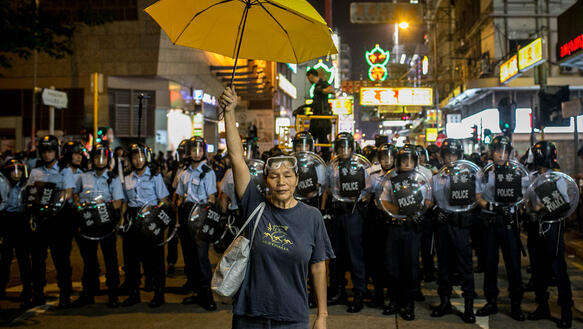DEINE SPENDE KANN LEBEN RETTEN!
Mit Amnesty kannst du dort helfen, wo es am dringendsten nötig ist.
DEINE SPENDE WIRKT!
Simbabwe: Gesetzentwurf gefährdet Zivilgesellschaft

Am 1. März gab die Regierung von Simbabwe den Entwurf einer Gesetzesnovelle zu privaten Freiwilligenorganisationen (Private Voluntary Organisation Amendment Bill 2024) bekannt. Ziel dieses Entwurfs soll es sein, "Geldwäsche und die Finanzierung von Terrorismus zu bekämpfen und Nichtregierungsorganisationen an der politischen Lobbyarbeit zu hindern". 2021 hatte sich der Präsident geweigert, den Entwurf zur Änderung des Gesetzes zu privaten Freiwilligenorganisationen zu unterzeichnen. Das ursprüngliche Gesetz ist seit August 2023 außer Kraft und es gab die Hoffnung, dass die Eingaben zivilgesellschaftlicher Organisationen im Jahr 2023 im neuen Entwurf Eingang gefunden hätten. Doch die meisten der angesprochenen Probleme wurden nicht berücksichtigt und der Gesetzentwurf enthält auch weiterhin Bestimmungen, die sich negativ auf den zivilgesellschaftlichen Handlungsspielraum auswirken werden und die weitere Existenz und Arbeit zivilgesellschaftlicher Organisationen gefährden.
Bitte verhindert die Einschränkungen der Arbeit von NGOs in Simbabwe!
Hier kannst du deinen Brief ausdrucken, um ihn per Post oder Fax an die Behörden zu senden, oder ihn direkt über dein eigenes E-Mail-Programm verschicken.
Du hast Probleme beim Ausdrucken des Briefes? Dann klicke bitte hier.
Achtung: Bitte prüfe bei der Deutschen Post ob die Briefzustellung in das Zielland ungehindert möglich ist.
Appell an
Speaker of Parliament
Jacob Francis Nzwidamilimo Mudena
Parliament of Zimbabwe
Kwame Nkrumah & 3rd Street
Box CY 298 Causeway
Harare
SIMBABWE
Sende eine Kopie an
Botschaft der Republik Simbabwe
I.E. Frau Alice Mashingaidze
Dannenwalder Weg 91
13439 Berlin
E-Mail: infor@zimembassyberlin.com
Amnesty fordert:
- Ich fordere sie auf, eine echte öffentliche Konsultation durchzuführen und alle Klauseln im PVO-Gesetzentwurf 2024 zu streichen, durch die die Rechte auf freie Meinungsäußerung und Vereinigungsfreiheit untergraben und zivilgesellschaftliche Organisationen an ihrer Arbeit gehindert würden. Außerdem fordere ich Sie auf, Empfehlungen zivilgesellschaftlicher Organisationen im Rahmen des Konsultationsprozesses umfassend zu berücksichtigen
- Sorgen Sie außerdem dafür, dass die Behörden eine gründliche Bewertung der in den letzten fünf Jahren erlassenen Gesetze vornehmen und Bestimmungen aufheben/ändern, die mit der Verfassung Simbabwes und den internationalen Menschenrechtsabkommen, denen das Land beigetreten ist, unvereinbar sind.
Sachlage
Am 1. März gab die Regierung von Simbabwe amtlich den Entwurf einer Gesetzesnovelle zu privaten Freiwilligenorganisationen (Private Voluntary Organisation Amendment Bill 2024) bekannt, der direkt zur ersten Anhörung im Parlament vorgelegt wurde. Der Gesetzentwurf und seine Auswirkungen auf die Arbeit von Nichtregierungsorganisationen (NGOs) und die Rechte auf freie Meinungsäußerung und Vereinigung in Simbabwe geben Anlassung zur Sorge.
Im November 2021 hatten die Behörden den Gesetzentwurf zu privaten Freiwilligenorganisationen (Private Voluntary Organisation (PVO) Amendment Bill HB 10) von 2021 erstmals amtlich bekanntgegeben. Er sollte der Regierung zufolge dazu dienen, Geldwäsche und Terrorismusfinanzierung zu bekämpfen und politische Lobbyarbeit von NGOs zu verhindern. Die Regierung begründete die Änderungen am bestehenden Gesetz über private Freiwilligenorganisationen damit, dass damit die Forderungen des internationalen Gremiums zur Eindämmung von Geldwäsche und Terrorismusfinanzierung (Financial Action Task Force) umgesetzt würden. Besorgniserregend ist, dass das Parlament die Eingaben der Öffentlichkeit während der öffentlichen Anhörungen im Parlament im Jahr 2022 nicht beachtet hat. Damals zeigte sich, dass viele Menschen gegen eine Verabschiedung des Gesetzes waren. Im Februar 2023 wurde der Gesetzentwurf von der Nationalversammlung und auch vom Senat verabschiedet und dem Präsidenten zur Unterzeichnung vorgelegt. Im September 2023 wurde jedoch berichtet, dass der Präsident sich geweigert hatte, das Gesetz zu unterzeichnen, und es mit Vorbehalten an das Parlament zurückgeschickt hatte.
Sollte der Gesetzentwurf 2024 verabschiedet werden, würde er die wichtige Arbeit zivilgesellschaftlicher Organisationen in Simbabwe stark einschränken. In einigen Bestimmungen des Gesetzentwurfs werden dem zuständigen Minister und der Registrierungsbehörde weitreichende Befugnisse eingeräumt, die dazu genutzt werden könnten, die Unabhängigkeit und die Tätigkeit von NGOs einzuschränken. Der Gesetzentwurf muss zurückgenommen oder geändert werden, um das Gesetz mit den Menschenrechtsverpflichtungen Simbabwes in Einklang zu bringen.
Hintergrundinformation
(auf Englisch)
Zimbabwe was placed on Financial Action Task Force’s monitoring programme in 2018 after gaps were noted in its policy and legal framework. In 2022 the country was removed from the FATF grey list; however, the government continues to push for the enactment of the PVO Amendment Bill.
On 31 August 2021, the Zimbabwe Government, through its cabinet, approved amendments to the Private Voluntary Amendment Act which were proposed by the Minister of Justice, Legal and Parliamentary Affairs. The proposed changes to the Act were met with widespread scepticism based on the current national context and historical experiences. The interpretation of the provisions of the proposed PVO Amendment bill 2021 must be understood in the current context within which it is proposed. Overall, post-election disputes, a collapsing economy and widespread economic hardships caused by poor economic policies and austerity measures have raised tensions in the country. NGOs have been falsely accused of meddling in political affairs and stirring the populace to vote against the ruling party.
The PVO Amendment Bill 2021 placed all civic organisations registered under different laws under one law and the clauses indicate an attempt to control and shut down civil society perceived to be 'anti-government.’ The bill aimed to limit CSOs activities and infringe on their constitutionally guaranteed civil and political rights. The Bill contains vague provisions where supporting or opposing a political party or candidate is prohibited, but it is not clear what supporting or opposing a political party means. Civil society has presented oral and written submissions, including the 'CSOs’ Consolidated Analysis of the PVO Bill’, highlighting their concerns to the Parliament Legal Committee, Parliament Portfolio Committee on Public Service. On 11 April 2022, civil society met with the Minister of Justice during a consultative meeting and the Minister addressed parliament agreeing to introduce various amendments. The proposed amendments which the Minister of Public Service, Labour and Social Welfare brought back to Parliament are more repressive than the first with provisions that introduced additional, excessively punitive, criminal and civil penalties for noncomplying PVOs, as well as individual liability for trustees, employees and managers of PVOs, and anyone involved in the control of a PVO, including members of the public.
In 2022, Civil Society Organisations (CSOs) reached out to President Emmerson Mnangagwa and engaged him highlighting that the PVO Amendment Bill contained provisions which were not in line with international human rights standards and the Constitution and would hinder the work of CSOs. They further submitted that Zimbabwe has adequate regulatory regime which could be used to ensure that CSOs are not used to finance terrorism and money laundering.
In February 2023, PVO Amendment bill 2021 was passed by both the National Assembly and Senate and was submitted to the president for signing, however the presided not sign and sent the bill back to parliament with reservations. In August the PVO Amendment bill 2021 lapsed when parliament dissolved ahead of the 2023 elections. In October 2023, the PVO amendment was included in the list of bills when the president announced the legislative agenda. The PVO Amendment Bill 2024 was gazzetted in March 2020 and was introduced immediately in parliament for the first reading. The new bill remain repressive and has not taken into account any concerns raised by CSOs or inputs from the public during the parliamentary public hearings for the previous PVO Amendment bill 2021.
